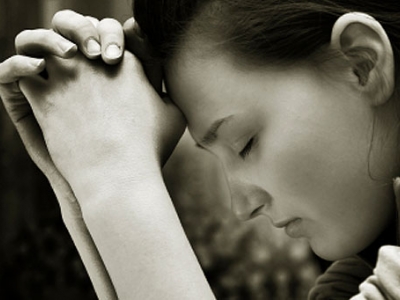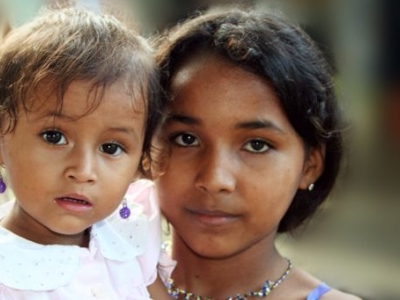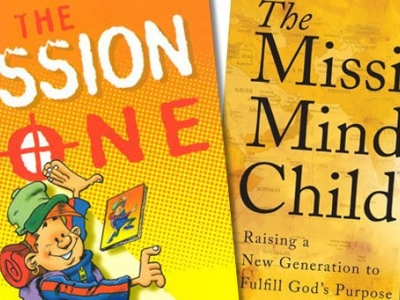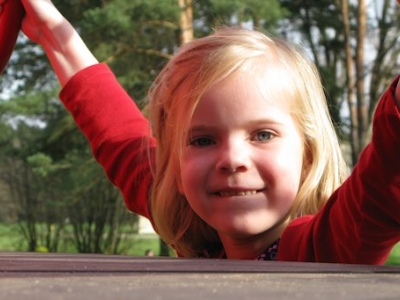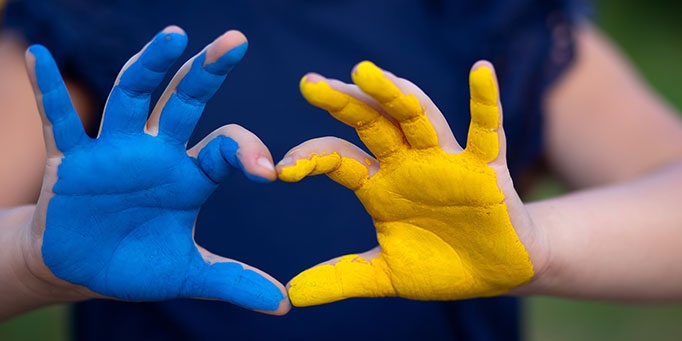
Talking with kids about Ukraine
An interview with Claudia Pohn from European Christian Mission.
Where does your family live? Does the conflict in Ukraine feel close?
My family lives in the West of Austria, where Germany, Switzerland and Austria meet. By European standards, Ukraine doesn’t feel close in the way that our eight next-door neighbours do—but it’s still only one country removed (Slovakia and Hungary are in between).
The distance from our capital, Vienna, to the Ukrainian border is about 430km, which is shorter than the distance between Vienna and my hometown. So it’s not really that far away.
What does feel ‘close to home’ is the idea of active, open warfare involving a military superpower on European soil. It’s not simply a conflict between various groups within the confines of a nation.
Are there any ECM workers in Ukraine? How are they doing?
Yes, there are over 25 local workers on ECM’s New Hope Ukraine team in Lviv, in the West of Ukraine. To my knowledge, they are currently safe and preparing for an influx of in-country refugees. They are hoping to be able to serve their fellow Ukrainians in the name of Christ at this time of crisis. ECM has also created a crisis response team and is taking donations to further the support and relief effort in Lviv.
How have you tried to manage your own emotional response to the crisis?
The way I usually do: by allowing myself to consume an exorbitant amount of news from reliable sources for a few days while trying to still go about my daily responsibilities. And by joining online prayer meetings to help me re-orient my heart and rightly interpret what’s happening from a perspective of faith in a good and sovereign God.
I really need the community of believers at a time like this to remind me of our merciful God who is in control every step of the way, both in history at large and on a personal level. On my own, I tend to freeze in front of a screen, reading and watching newsflash after newsflash. So I’m deeply grateful for online prayer meetings where I can simply say ‘Amen’ to wise, heartfelt and Scripture-soaked words brought before the throne of grace—words spoken by people who are willing and able to give support on the ground, not just their opinion on a news outlet.
I used to feel quite guilty for getting sucked into the news cycle in this way when something scary happens. But I’ve come to recognise that it’s my personal coping mechanism—an expression of my own grief, shock and anxiety—and a way of seeking truth and love, however imperfectly. I’m seeking truth by soaking up as much reliable information as I can for a few days. And I’m seeking love by joining other believers in prayer, acknowledging my utter inability to control even my own anxious response, let alone this world. In prayer, I’m laying the whole situation before our good heavenly Father, trusting that he can do more than I can even ask or imagine; knowing that his love is perfect, even in a catastrophe, as the cross demonstrates so clearly.
What questions have your kids been asking? How have you responded?
As the events of the invasion unfolded on Thursday morning, our 12-year-old was confronted with the news right away at school by his classmates, many of whom have various social media apps on their smartphones. Apparently, some of them told him that World War III had started. I hadn’t even checked the news that morning myself, so I had no idea of the unfolding events until later on. When he came home, our son’s two biggest questions were: firstly, whether there would be atomic bombs and we would be affected; and secondly, whether his dad would have to go and fight. Thankfully, at least one of them was easy enough to answer, since Austria signed a declaration of neutrality back in 1955 and is thus prohibited from sending troops. I think our younger kids only asked whether the war would come to us.
Do you let your kids watch the news?
The simple answer to this is ‘Yes, but ...’. We don’t own a TV, so all our news intake is on-demand. Our 12-year-old son has a very keen interest in what’s happening on the world stage. This began a few years ago when he started discussing international politics with his Turkish-speaking classmate and neighbour on the way to and from primary school. It made for interesting conversation (and at times some creative re-direction efforts) at the lunch table: ‘My friend says President Trump supports terrorists in Turkey. Is that true?’
So we’ve taken an approach of ‘getting there first’ by allowing our son unlimited access to a couple of news sites of our choosing—and he must ask permission before accessing them. This gives us some control over the timing of the conversations that will inevitably follow and it’s been a great way for us to teach him that the source of information matters. Whenever he comes home with an isolated snippet of news from a Tiktok video he’s seen on a friend’s mobile phone, our first question always is: ‘Where did your friend get his information? And what is the source of that Tiktok video?’.
Quite regularly we end up falling back on that great line of parental self-defence: ‘I don’t know, but I could find out for you’. Often, when I try to pin down a time to research a question together, our son loses interest, because he realises that getting reliable information is actually hard work, and things are rarely black and white.
Our three daughters (aged 10, 8 and 5) don’t express an interest in the news yet, so we usually don’t actively push it on them. However, due to the gravity and the relative proximity of the situation in Ukraine, I outlined the general sweep of what’s going on to them a day after the fighting began. I think I only used two or three sentences, explaining that unfortunately a war had begun in a country here in Europe and that I wanted them to hear the news from us rather than others. I also emphasised that we are safe where we are, and that God is stronger than everyone. So far, they haven’t asked for any more information.
What are the main messages that you’re trying to communicate to your kids?
Firstly, it’s important not to close our eyes when something terrible is happening. Read the news; don’t avoid what’s going on.
Secondly, it’s important not to lose our head when something terrible is happening. We need to keep on going about our own day responsibly—pray and have compassion, but don’t get sucked into fear and panic.
Thirdly, it’s paramount to remember who our God is when something terrible is happening. Set things into a broader perspective of faith in Christ—both in our thinking, by remembering the truths of Scripture, and in our feelings by praying.
And finally, check our hearts as well as our sources. This goes in two directions: avoiding indifference or voyeurism on the one hand; but also avoiding anxiously overreacting and letting the news affect our daily functioning in an unhealthy way.
Overall, I think I mainly deal with the situation by responding thoughtfully to our children’s needs as they arise, rather than pro-actively trying to teach a message. If anxiety shows up, we can pray together and acknowledge our emotions before God. If questions come up, we can gather information, recognising that we are neither omniscient nor all-wise, but God is.
I also make a point of letting my children see me attending online prayer meetings when they happen throughout the day, and talking to them about ways people are already attempting to help those affected by the crisis so they can see that there is hope in the midst of suffering.
Are there any practical ways that your family is trying to help?
Yes, in small ways. We try to be responsible in our communication, which means honouring ECM’s request not to contact the workers in Ukraine directly, while at the same time upholding them in prayer. I also have two good acquaintances here in Austria who are originally from the Ukraine. I decided to send them both a short message to let them know that I care about their situation, to assure them of my prayers and to ask about their family back home. ECM has also set up an avenue for financially supporting the team on the ground in Ukraine, so we’re going to consider this option as a family as well.
---
Claudia Pohn lives with her husband, a full-time pastor, and their four children in Dornbirn, Austria. With the support of ECM, they serve God’s people in their local evangelical church and further afield. Claudia is also a teacher. The Pohns have a long connection with Australia and are graduates of SMBC.
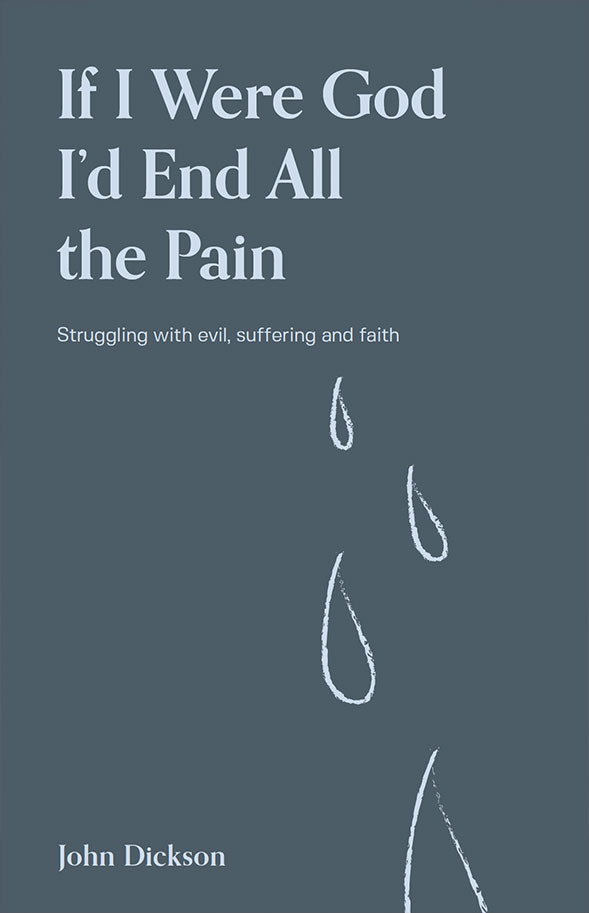
If I Were God, I'd End All the Pain
Why does God allow suffering? If God is all powerful and loving why is there so much pain in the world? In this short book John Dickson looks at what the world says about suffering before turning to the Bible to see what it says about God, justice and suffering.
For more articles from Growing Faith, subscribe to our monthly e-newsletter.
To hear about the latest books and resources from Youthworks Media, subscribe here.


